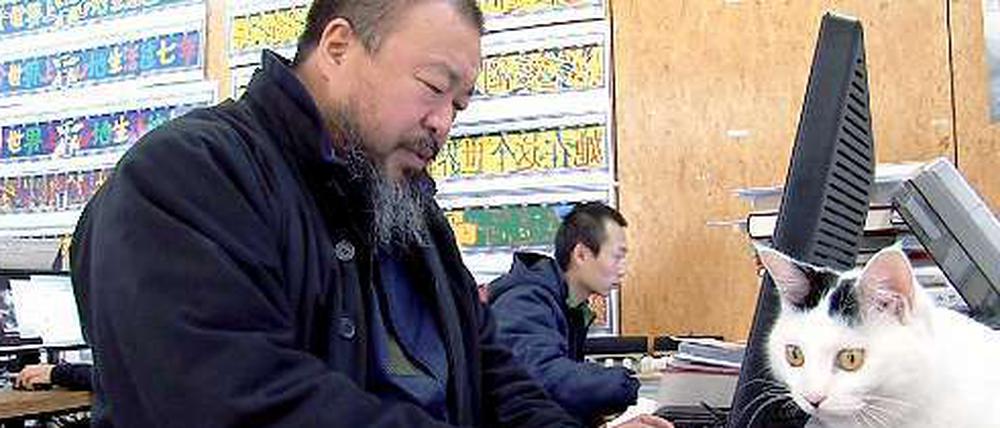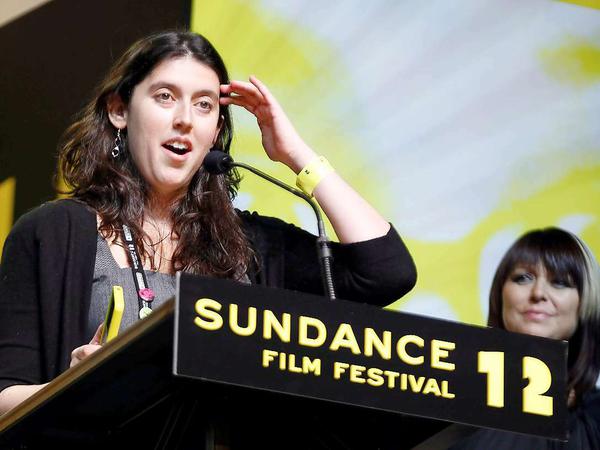
© dpa
Ai Weiwei: Never Sorry: "Ai is not a Superhuman"
Ai Weiwei is China's most outspoken domestic critic. The 28-year-old director Alison Klayman's first feature film covers many aspects of the artist-and-dissident’s life and work, says Jan Cao.
At the very beginning of the documentary, a cat jumps up to reach the handle and opens the door. Ai comments, “Cats can open the door, but only men can close it.” What does he mean? The first-time documentary filmmaker Alison Klayman leaves the question to her audience.
The 28-year-old director Klayman spent two years shadowing Ai with her camera, including following him to two of his most ambitious shows, “So Sorry” in Haus der Kunst Munich (2009) and “Sunflower Seeds” at the Tate Modern Turbine Hall in London (2010).
Shortly after Klayman graduated from Brown University with a degree in history, she went to China looking for an opportunity as a freelance journalist. She started by shooting a short video accompanying an exhibition of Ai’s photographs, and ended up producing a 90-minute documentary that won the special jury prize at the Sundance Film Festival in January.
Who is Ai Weiwei? For Klayman, the answer is far more complicated than the audience might expect. He is a performance artist who lived in New York for more than ten years, an architect who helped design the “Bird’s Nest,” also known as the National Stadium built for the Beijing Olympics, but later spoke against the Beijing Games, and a dissident who is depicted as a “hooligan” by his artist friend Chen Danqing. He is also son of famous Chinese poet Ai Qing, husband of artist Lu Qing, and father of a three-year-old sweet young boy. He likes cats and ice-cream.

© dpa
“The title, ‘Never Sorry,’ was a play on the title of Ai’s Munich show, according to the director. Never sorry seemed more like his attitude,” said Klayman in an interview with Tagesspiegel.
The detailed portrait of Ai Weiwei focuses on his belief in freedom of speech and his deep concerns for his country. It also explains how this outspoken artist and dissident is able to inspire global audiences against a backdrop of strict censorship. Klayman quotes Ai’s own words about how he is expecting the audiences to do after watching this film: “…They will first have some knowledge about who I am and what kind of issues I am always concerned about as an artist. I think they should really think that freedom of expression is very valuable, and they should treasure this right.”
But this film isn’t just about Ai’s role as a public intellectual. Klayman manages to show some of Ai’s personal moments with his family and friends. She doesn’t avoid presenting him as a man with flaws, either — Ai had his only son through an extra-marital affair. “It was important to show Ai Weiwei as a father, not only because his son plays a crucial role in his life, but also because it’s one of the major reasons why authorities are now able to put more pressure on him,” says Klayman. “Without getting too much into his personal life, it was also important not to hide the truth, and to show that Weiwei is not a superhuman. He is a real person.”
“Never Sorry” is also the product of close team work. Zhao Zhao, Ai’s personal assistant, has contributed some clips to this documentary. Zhao, an artist and videographer himself, has helped to produce some of Ai’s documentary films. He is seen in “Never Sorry” filming the policemen’s camera when they were filming Ai having dinner with his fans in Lao Ma Ti Hua, a restaurant in Chengdu.
Photo Gallery: the Naked Protest of Ai's Internet Fans
Zhao as an artist is nothing like the quiet, calm cameraman as seen in Klayman’s film. He once stole metal from Anselm Kiefer’s “Library” installation, formerly on view in the main hall of the Hamburger Bahnhof Museum Berlin, and cast it into a one Euro coin. The Hamburger Bahnhof Museum at first saw this incident as a humiliation and wanted to sue the rebellious young man, but the museum ended up buying this piece back as part of their collection.”
The 30-year-old videographer from Xinjiang sees Klayman’s first feature documentary as a job well done. “Alison is patient and calm. She has captured many valuable moments, and I think she did all that a documentary director should be doing in the making of ‘Never Sorry.’”
However, as a foreign journalist, Klayman had been less involved herself in the often complicated confrontations with authorities. “Sometimes Weiwei or his lawyers would tell me to wait in the car, while they went to places like the police stations for the first time. It was not because of concern for my safety, but rather for the Chinese citizens I was traveling with, ” explains Klayman.
- showPaywall:
- false
- isSubscriber:
- false
- isPaid:
- showPaywallPiano:
- false